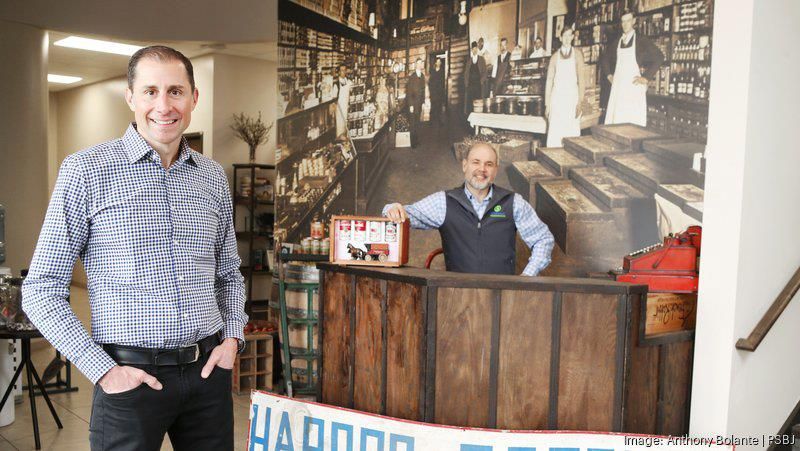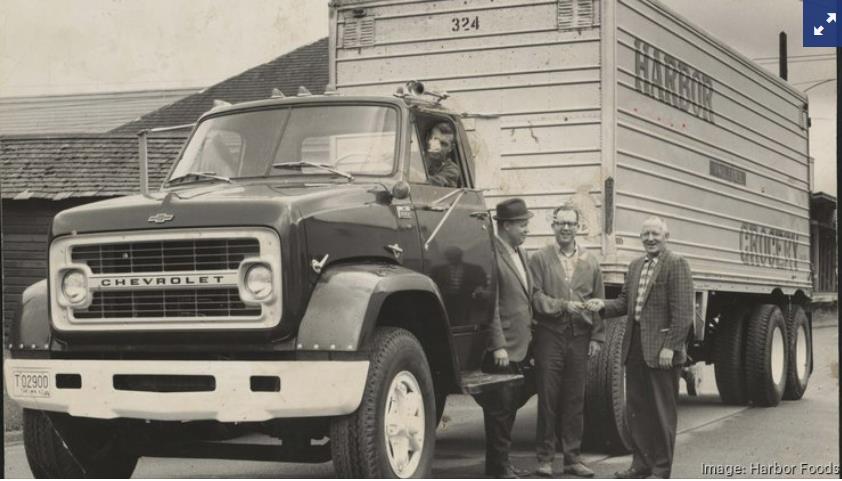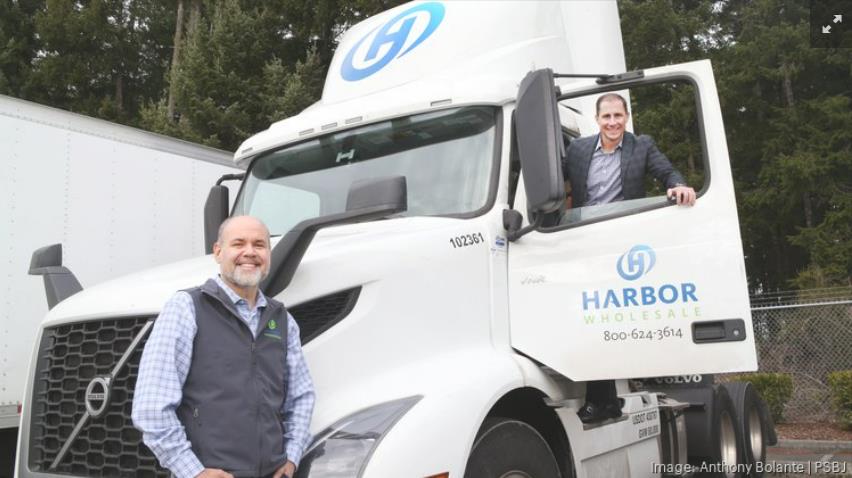
MEMBER NEWS: Harbor Foods Named Family Business of the Year
Family behind Harbor Foods keeps it fresh after 100 years
March 16, 2023, 10:00 p.m., PDT
As Harbor Foods enters its 100th year under the leadership of Justin Erickson (left) and Scott Erickson, the company’s revenue is expected to exceed $1.7 billion in 2023.
In the mid-1970s, Mike Erickson and his brother Steve Erickson made a bold decision that ultimately changed the course of their family-owned business and put it on the trajectory to become a billion-dollar company.
After much discussion, the brothers — with the blessing of their dad Carl and uncle Jim — invested in a $120,000 computer that allowed them to scale up their distribution operations and create invoices that looked “like the big guys,” Mike remembers.
The gamble paid off. Now, 50 years later, Harbor Foods is one of the big guys in food distribution.
“It was about the time that micro and mini computers were coming of age,” Mike said. “We knew we needed to invest in that if we wanted to compete. It was a lot of money and a bit of a risk. We thought about it for a while and then, one day, my brother and I went into a backroom and looked at each other and said, ‘Do we want to do this?’”
As Harbor Foods celebrates its 100th year, the fourth-generation family-owned company’s revenue will exceed $1.7 billion in 2023.
The company, which is being recognized as the Family Business of the Year by the Business Journal, began in 1923 in Aberdeen when Carl V. Erickson launched a mom-and-pop logging camp supplier of milk, butter and eggs.
Today, the company is run by Mike’s son, Justin, who is the CEO, and Steve’s son, Scott, who is the chief technology officer.

Growing up in the business
Mike, who was born in 1950, spent most of his life at the company and remembers working with his dad, uncles and grandfather Carl, the company’s founder.
Back then, the company was small and enrolling the help of young family members was always welcome.
“I did odd jobs, and I suppose I occasionally got in the way as well,” Mike said. “But I have fond memories of working at the business as a kid and then running over to my grandparents’ house, which was just 200 yards away.”
Mike and his brother never spent too much time thinking about whether or not they were going to commit themselves to the family business for the rest of their lives, Mike said. There was never a guarantee that the business would be there in the long run.
“When I was a teenager, it was just ‘let’s get through the week and then deal with next week,’” he recalls. “We didn’t have a glimmering hope that we would be taking over a big company. We didn’t even have a line of credit until the year 2000.”
Both brothers kept their options open by earning their two-year college degrees in the evening while working in the family business.
“I liked electrical engineering and my brother liked accounting,” he said. “My brother also spent three years in the Navy. My oldest brother, Bob, became an attorney. He had his sights set on other things.”
Eventually, members of the Erickson family’s fourth generation — who are now in their 40s and early 50s — started helping their dads and grandfather Carl.
As the oldest cousin, Scott was the first to get acclimated in the family business.
“I remember sweeping the wood floors of the old warehouse in Aberdeen,” Scott said. “I would get dropped off and as a kid, you never really knew why. I suppose it could have been to give my mom a break. It was fun. I would drop a quarter in a box that would then give me a candy bar.”
Scott’s first “real job” at the company was to separate candles that had been melted together.
“My grandpa paid me for each box that was completed,” he said. “That was the first time I was paid to work.”
Justin, who is four years younger, has similar memories of his early days working for the business. He started showing up for work about age 10. His favorite part of work was riding in the semi-trucks with his dad.
As he got older, Justin took on the job of washing the trucks every Saturday.
“There were only about eight to 12 trucks back then,” Justin said. Today the company has about 175.
Justin’s passion for big rigs never abated. At 18, he got a commercial driver’s license so he could deliver goods during his summer breaks from college.
“I drove trucks all over the Northwest, from downtown Seattle to Bellingham,” he said. “That’s when I learned that I enjoyed interacting with the customers. When I got out of college at University of Puget Sound I went into sales. My dad told me if you have the relationship with the customers, you will have strength and leadership in the business. It was important to him that I build that relationship with the customers.”
But the sales side of the business didn’t come easy for Justin.
“I don’t think colleges train people to go out and sell stuff,” he said. “And our industry has some inherent challenges. We sell to convenience stores, gas stations. Some owners have English as their second language so there can be miscommunication. I really had to learn quickly so I could be of service to our customers.”

Ripe for success
The company has moved a few times over the past 100 years. Its biggest relocation was from Aberdeen to Tumwater in 1985 to be closer to the Interstate 5 corridor. In 2011, the company moved to its current location, a 212,000-square-foot facility in Lacey.
Harbor Foods now has three subsidiaries and is growing at a rapid pace. It has increased its revenue from $375 million in 2012 to a projected $1.7 billion in 2023.
“The company was started with a true entrepreneurial dream,” Erickson said. “Our original roots are still alive in the industry we serve.”
Harbor Foods is the largest independent fourth-generation family owned distributor on the West Coast and the fifth-largest family owned business in Washington, according to Business Journal research.
Harbor Foods has two distribution subsidiaries under its umbrella: Harbor Wholesale and Harbor Foodservice. Its wholesale branch services convenience stores, grocery stores and quick-serve restaurants. Its food-service side focuses on the restaurant industry. Northlink, which provides third-party transportation services and logistics, is also under the company’s umbrella.
Within the last few months, the company has acquired two other companies, fourth-generation family-owned MTC Distributing of California and Nevada, and the multigeneration family-owned Halfon Candy Co. of Seattle.
All of Harbor Foods’ major acquisitions have been family-owned businesses, Justin said. It makes sense for family businesses to sell to one another because they share a unique bond and culture.
“We have developed a culture here where we treat employees like family because, in the beginning, it was family,” he said. “Now, our family isn’t just the Ericksons, it’s everyone who works here. We have a culture of caring for our people and their families.”
For Scott, growing up in the family business meant making meaningful connections.
“As a family you get to share the wins beyond the workplace,” he said. “Having a family business creates a tighter bond.”
When it comes to succession, family businesses can be tricky.
“Each family is so dynamic and unique,” Mike said. “There’s no onesize-fits-all. We have been blessed. For us to make it into the fourth generation is really something.”
It’s important for family business leaders to remember that leadership itself can’t be taught, Mike said.
“A lot of family businesses try to make a leader out of someone, but you can’t,” he said. “Family members either have that passion and they strive for it, or they don’t. It’s not just 100% that you have to give to a company, it’s 120%. And the employees are always watching what you do because you are their livelihoods.”
Though the company now has a board of directors, Harbor Foods remains 100% privately owned, Justin said. All family members have some stake in the company.
The company’s next, and fifth generation, ranges in age from the mid-teens to the early 20s. Justin has been thinking about how to best pass the company on when the time comes.
Be clear that this is the family business, that there is a vision and about what the vision is, he said.
“I also want to be clear about the rules of engagement,” he said.
“As a family member, how do you become an employee and an owner? What is your responsibility and how do you become a good steward of the company?”
The important thing is for the family to take care of the business, he said.
“If the family takes care of the business,” Justin said, “then the business will take care of the family.”
Shawna De La Rosa
Reporter - Puget Sound Business Journal